- 24/7 Free Consultation: (888) 424-5757 Tap Here To Call Us
Chicago Daycare Abuse Lawsuit Guide

Rosenfeld Injury Lawyers is committed to fighting for families affected by daycare abuse. We work tirelessly to hold negligent daycare centers accountable and seek justice for every child harmed by abuse, neglect, or unsafe settings. Contact us to help you file a daycare abuse lawsuit.
When you leave your child in the care of a provider, you trust they will be protected, nurtured, and safe. Unfortunately, in Chicago and throughout Illinois, some facilities betray that trust. When daycare abuse or negligence occurs, it can result in devastating physical injuries, psychological trauma, and lasting harm.
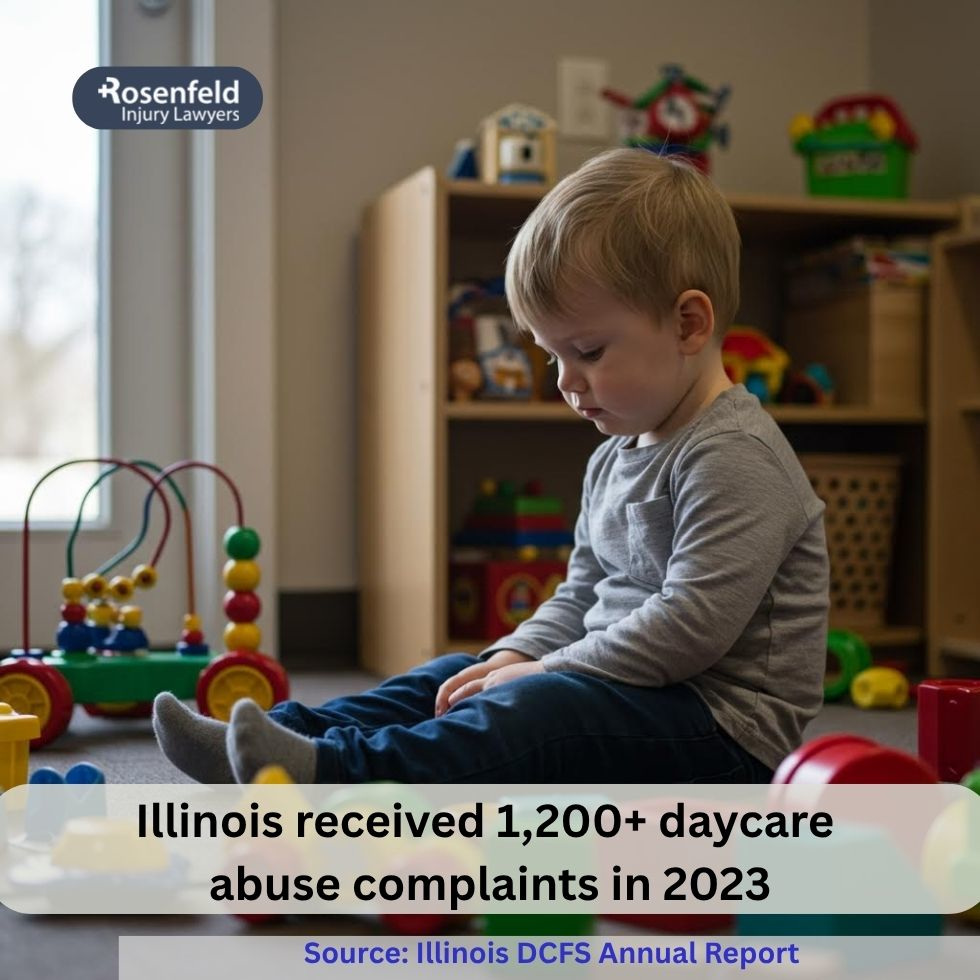
Understanding Daycare Abuse vs. Daycare Neglect
When pursuing a daycare abuse lawsuit, it’s important to understand the difference between abuse and neglect.
Abuse
This involves intentional acts that cause physical and sexual abuse or emotional harm to a child. Physical abuse might include hitting or improper restraint. At the same time, emotional abuse includes threats, humiliation, and verbal degradation. Sexual misconduct involves any inappropriate sexual contact or exploitation by staff, visitors, or others due to negligent security.
Neglect
Neglect occurs when a center fails to meet a child’s basic needs for supervision, hygiene, nutrition, safety, or medical care. It may not involve intentional harm, but it can lead to just as traumatic situations.
Both forms of mistreatment can lead to a viable abuse claim. Our personal injury lawyers understand how to differentiate these issues under Illinois law.
Types of Illinois Childcare Facilities
Illinois early development centers include licensed facilities regulated by the Illinois Department of Early Childhood, which was established in 2024. These facilities are required to meet strict health, safety, and staffing standards.
In contrast, a group home generally refers to facilities that care for older children, children with disabilities, or adults who need specialized care. Group homes are governed by various regulations, including Community Integrated Living Arrangements (CILAs).
This article focuses on abuse and negligence occurring within general youth care centers, not group homes.
Common Forms of Child Abuse and Daycare Accidents
Children can suffer harm in daycare settings in many ways. Common causes of injury at daycare include:
- Neglect leading to accidents (e.g., falls, playground injuries, choking, wandering off).
- Physical Abuse (e.g., intentional hitting, shaking, slapping, or improper restraint).
- Emotional/Verbal Abuse (e.g., name-calling, threats, intimidation).
- Sexual Abuse (e.g., assault or exploitation by staff or outsiders with access).
- Unsafe Premises (e.g., broken playground equipment, tripping hazards, unsecured chemicals).
- Medical Neglect (e.g., failure to administer medications properly or respond to allergic reactions).
Daycare negligence can cause serious physical injuries that require immediate medical attention and ongoing therapy sessions.
Neglect (Supervision, Basic Needs, Safety)
Neglect is one of the leading causes of daycare injuries. It includes:
Inadequate Supervision
Children left unattended are at risk of serious harm. A toddler can easily wander off, fall from play equipment, or suffer an accident without proper supervision.
Failure to Meet Basic and Medical Needs
Neglecting a child’s need for food, water, hygiene, and bathroom use can cause dehydration, malnutrition, severe diaper rash, and emotional distress. Failing to provide prescribed medication, ignoring allergies, or delaying medical attention after an injury can lead to repeated violations of safety and well-being.
Unsafe Environments
Exposed electrical cords, sharp furniture edges, unsecured cleaning supplies, and broken playground equipment all reflect gross negligence in maintaining a safe daycare facility.
When a service center does not meet its legal duty of care, a daycare injury lawyer can hold the negligent daycare legally responsible for the child’s injuries.
Physical Abuse Indicators
Physical abuse can leave visible injuries, emotional scars, and long-term damage to a child’s well-being.
Families should be alert for signs of physical abuse, including:
- Bruises and Cuts: Unexplained bruises, cuts, or scrapes that a child cannot explain may be a red flag. Particular concern arises when bruises appear in unusual areas, such as the back, thighs, or upper arms.
- Burns: Burns, particularly in patterns that suggest an object or hand was involved, must be taken seriously. These injuries often indicate intentional harm.
- Fractures and Sprains: Bone fractures, sprains, or repeated injuries without a clear explanation can point to abuse, neglectful supervision, or unsafe environments.
- Marks from Restraints: Rope burns, strap marks, or bruises around the wrists or ankles can indicate the improper use of restraint methods by staff.
When noticeable injuries are ignored or brushed aside by a provider, it may signal deeper systemic issues at the facility. Every suspected case must be investigated to stop continued trauma.
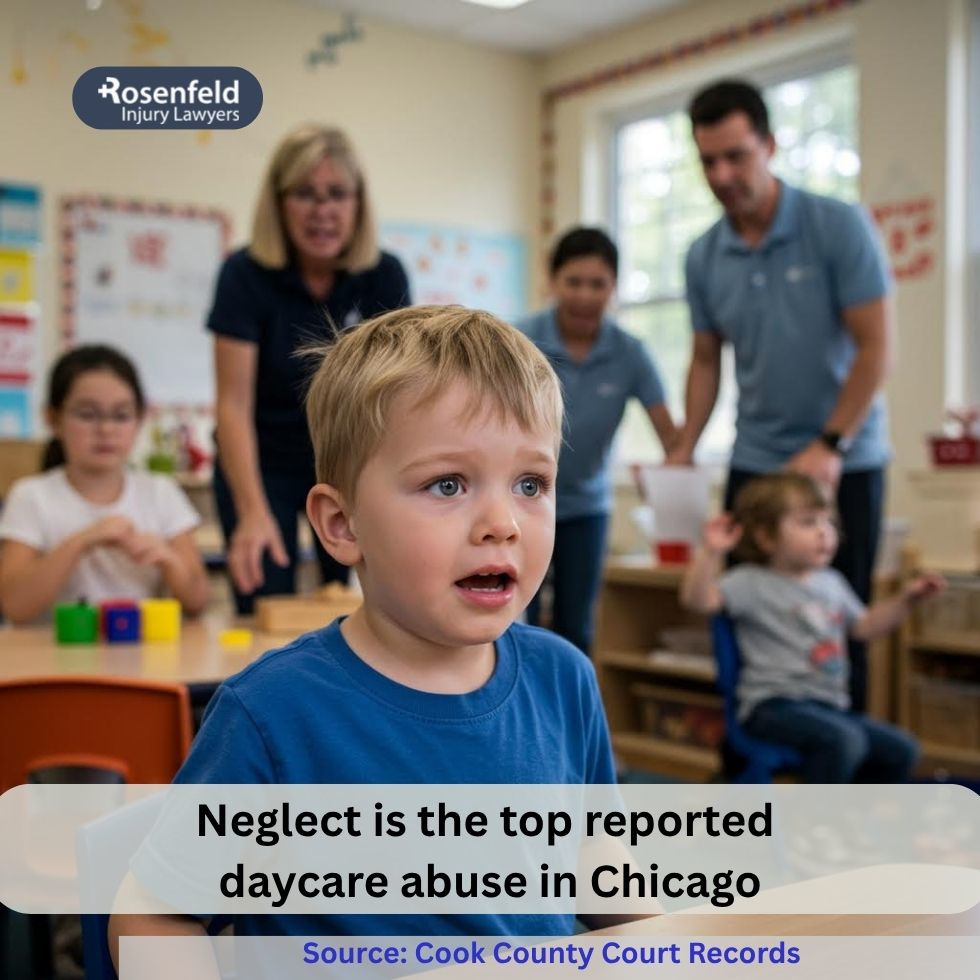
Emotional and Verbal Abuse Signs
Not all abuse leaves visible scars. Emotional abuse by staff can deeply affect a child’s development and mental health.
Signs of emotional abuse include:
- Fearfulness or Anxiety: A child may appear unusually anxious, fearful of certain individuals, or apprehensive about attending the care center.
- Sudden Withdrawal: Children who become withdrawn, lose interest in activities, or exhibit regression (e.g., bedwetting) may be reacting to emotional mistreatment.
- Aggressive Behavior: Verbal abuse can cause children to act out aggressively at home or with peers.
- Low Self-Esteem: Children exposed to constant belittling, yelling, or humiliation may express feelings of worthlessness or sadness.
Mental anguish can have lasting effects on a child’s social and emotional growth. Identifying and addressing it early is crucial for their long-term well-being.
Recognizing Sexual Abuse Risks
Sexual assault is a horrific form of abuse that often goes undetected without vigilance. Daycares must properly screen their employees and maintain a secure environment to ensure the safety of the children in their care.
Warning signs that may suggest sexual abuse at daycare include:
- Behavioral Changes: Sudden aggression, withdrawal, or anxiety about certain people, bathrooms, or being alone.
- Inappropriate Knowledge or Behavior: If a child displays sexual knowledge or behaviors that are not age-appropriate, it may be a sign of exposure to sexual misconduct.
- Physical Symptoms: Redness, bruising, or pain in genital areas; difficulty sitting or walking; torn or blood-stained clothing.
Because children may not understand or be able to explain abuse, daycare providers must be vigilant. Families must report concerns immediately to the appropriate authorities and consult a daycare injury lawyer to seek justice.
Warning Signs Family Members Must Watch For
Parents and guardians should monitor for warning signs of abuse or neglect at daycares, including:
- Unexplained Injuries: Cuts, bruises, burns, or broken bones without a reasonable explanation.
- Fear of Daycare: A child who begs not to go to the center, displays panic when approaching the facility, or clings desperately to parents at drop-off.
- Changes in Behavior: Aggression, withdrawal, regression (bedwetting, thumb-sucking), nightmares, or new fears.
- Poor Hygiene: Frequent diaper rash, dirty clothing, unchanged diapers, or signs of neglect in appearance.
- Extreme Hunger or Thirst: Children coming home extremely hungry or dehydrated may indicate neglect.
Prompt action can protect a child from ongoing harm and preserve crucial evidence for a daycare negligence lawsuit.
Why Abuse and Neglect Occur in Daycare Facilities
Several factors contribute to the tragic reality of daycare abuse and neglect in Chicago:
- Inadequate Staffing: When centers operate with too few staff for the number of children, proper supervision becomes impossible.
- Poor Training: Staff members who lack training in child development, safety, and discipline may engage in harmful practices out of ignorance or frustration.
- Negligent Hiring Practices: Failing to properly vet employees, such as neglecting background checks, can allow dangerous individuals access to vulnerable children.
- Lack of Oversight: Management must actively monitor staff performance and respond swiftly to any complaints or concerns.
- Failure to Enforce Policies: Even if safety policies exist on paper, they must be consistently enforced on a daily basis.
Understanding why abuse occurs highlights the importance of thorough investigations and strong legal action. If your child was harmed due to daycare negligence, a daycare injury lawyer can help protect their rights and hold the daycare accountable.
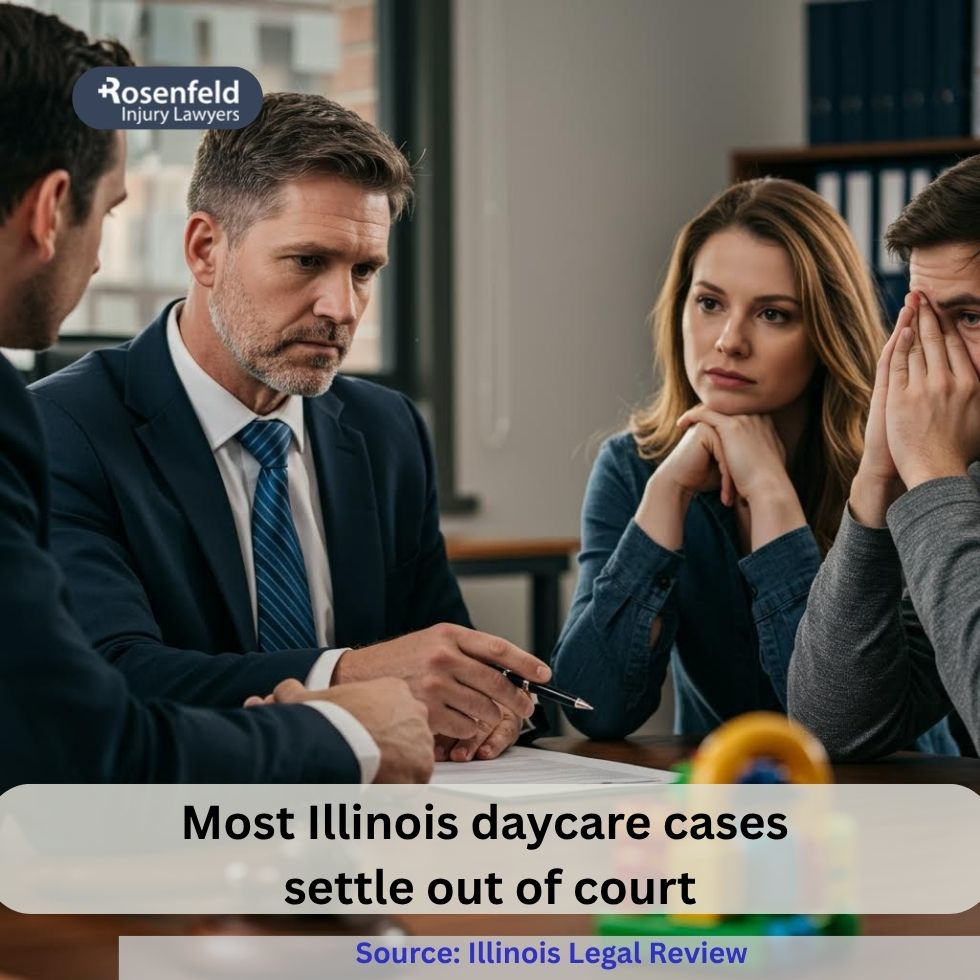
Illinois Regulations and Licensing Standards for Daycare Centers
In Illinois, daycare centers must meet strict licensing and safety standards. Facilities must comply with regulations regarding staff-to-child ratios, background checks, first aid certification, building safety, sanitation, and emergency procedures.
Licensed daycare centers must also maintain detailed medical records for every child in their care, including immunization histories and any care needs.
When a childcare center fails to comply with these requirements, it increases the risk of daycare injury, daycare neglect, and even severe child abuse.
Our daycare injury lawyers frequently uncover regulatory violations during investigations, which serve as vital evidence in daycare abuse settlements.
Key Licensing Requirements Include:
- Staff-to-child ratios: Specific ratios are mandated depending on children’s ages to prevent inadequate supervision.
- Background checks: All employees are required to pass a criminal background check.
- Health and safety standards: Daycare facilities must maintain clean, hazard-free environments and provide medical assistance when needed.
- Mandatory reporting: Care operators are legally obligated to report suspected child abuse to protective services immediately.
When a daycare fails to meet these regulations, it can lead to legal liability.
Other Relevant Laws That Strengthen a Daycare Abuse Lawsuit
While Illinois daycare centers are required to follow licensing and safety regulations, several other laws also play a significant role in daycare abuse lawsuits. Understanding these protections can help families seek justice after their child has been harmed.
The Illinois Abused and Neglected Child Reporting Act (ANCRA) requires every daycare provider, daycare staff member, and childcare worker to report any suspected child abuse or neglect immediately to child protective services.
Failing to report suspected harm not only endangers a child’s well-being but can also be used as powerful evidence in a daycare abuse lawsuit. If a daycare facility ignores warning signs or delays action when a child is in immediate danger, it may be held liable for any further harm.
Premises liability law in Illinois also protects kids in daycare settings. A daycare that allows unsafe playgrounds, broken furniture, unsecured chemicals, or other hazards to persist can face legal action for failing to maintain a safe environment. Dangerous conditions that contribute to an accident strengthen a personal injury claim.
Additionally, Illinois regulations strictly limit the use of physical restraint and prohibit the use of chemical restraint as a disciplinary method. Violations of these rules can form the basis of a lawsuit against the facility and the negligent daycare provider responsible.
Navigating the legal process requires an experienced lawyer who understands child injury law. Our Chicago child injury lawyers can help families gather medical bills, investigate daycare abuse claims, and pursue maximum compensation to protect their child’s future and well-being.
Holding the Daycare Facility Legally Liable for Harm
When a minor suffers from daycare negligence or abuse at a licensed care facility, the provider can be held legally responsible. Liability may arise through:
- Vicarious Liability: When daycare staff members commit abuse during their employment, the organization itself can be responsible.
- Negligent Hiring and Supervision: If a provider fails to screen, train, or supervise its employees properly, the facility can be held liable for gross negligence.
- Unsafe Conditions: If hazardous conditions (such as broken furniture, unsecured chemicals, or faulty playground equipment) lead to accidents, the facility is liable for failing to provide a safe environment.
Filing a child abuse claim against a negligent childcare facility is critical to holding them accountable and protecting other children from continued pain.
Legal Duties and Responsibilities of Chicago Daycare Providers
Youth care providers in Chicago have non-negotiable legal responsibilities that are fundamental to ensuring the health, emotional security, and daily welfare of the young individuals entrusted to them.
Meeting these standards reflects a broader commitment to safeguarding lives and nurturing safe spaces where growth and learning can occur without fear or preventable harm. Parents and guardians depend on these basic standards being met every hour of every day.
- Providing a Safe Physical Environment: Facilities must maintain safe, hazard-free spaces indoors and outdoors.
- Ensuring Adequate Supervision: Children must be actively supervised at all times to prevent accidents and abuse.
- Hiring and Training Qualified Staff: Facilities must conduct thorough background checks, verify references, and provide comprehensive training to their staff.
- Providing Proper Care: Daycare centers are obligated to address medical needs promptly and document any incidents involving injuries.
- Protecting Against Foreseeable Harm: Providers must anticipate potential risks and take steps to minimize them.
By failing to uphold these duties, these centers violate the protection of minors under the law, and families have grounds for legal action.
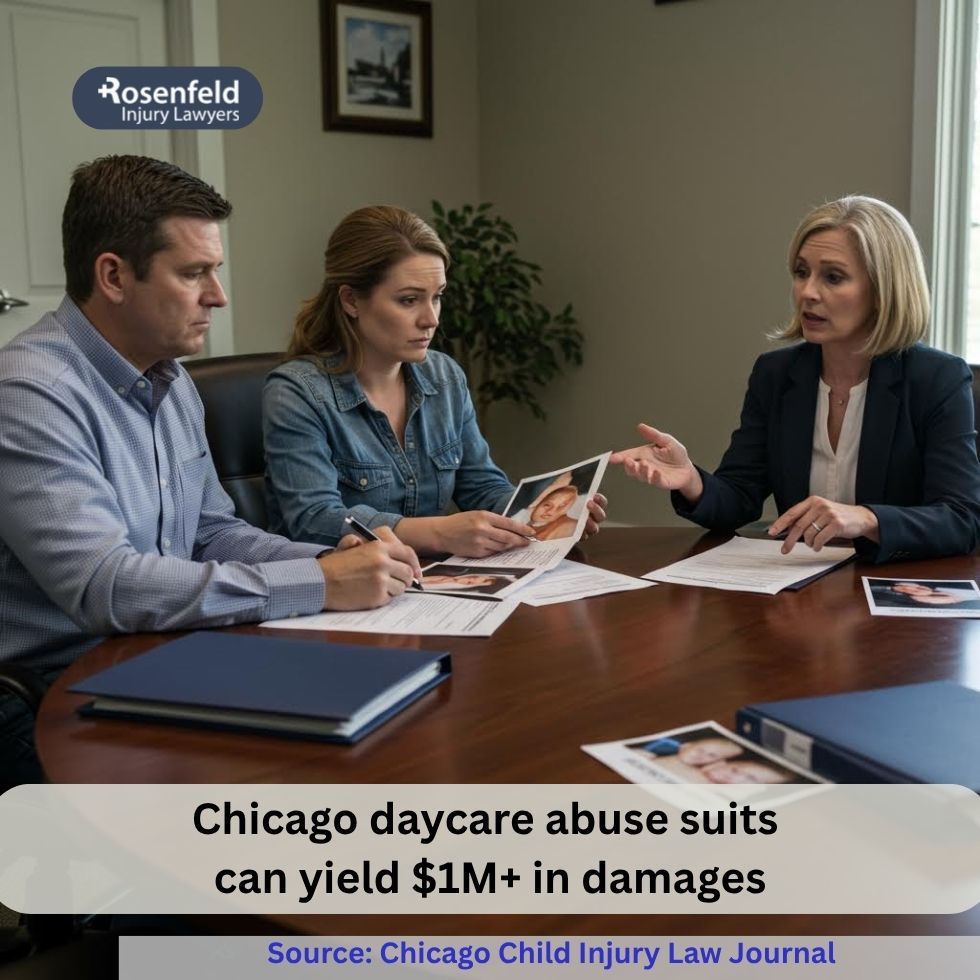
What to Do if You Suspect Daycare Abuse or Neglect
If you believe a child in your care may be a victim of daycare negligence or abuse, taking swift action is crucial. Early steps not only protect their safety but also strengthen any future legal claims. Acting quickly helps preserve critical evidence, ensures that medical needs are addressed, and alerts the proper authorities before further harm can occur.
Seeking professional guidance early also empowers families to make informed decisions about reporting, medical care, and possible legal remedies. Here are the steps to take:
- Prioritize Safety: Remove your child from the daycare facility immediately if you suspect danger.
- Seek Medical Attention: Have a healthcare professional evaluate the injuries or symptoms. Medical records documenting injuries and emotional upset are crucial proof in civil suits for abuse.
- Document Everything: Take detailed notes about what your child says, changes in behavior, injuries, and any facility reports. Preserve the clothing, take photographs, and record witness statements if available.
- Report to Center Management: Notify the facility in writing and request a written incident report.
- Report to Appropriate Authorities: Call the DCFS Child Abuse Hotline at 1-800-25-ABUSE and file a report with Child Protective Services..
- Consult an Experienced Lawyer: Contact an experienced Chicago daycare injury lawyer to discuss your legal options.
Taking these steps protects your child’s safety and preserves vital evidence needed to pursue maximum compensation.
Reporting Concerns to the Facility and State Authorities (DCFS)
Reporting abuse or neglect is not only critical for protecting a minor but also for preventing trauma to others. You should:
- Report internally to the center’s administration and demand written acknowledgment.
- Report externally to the proper authorities. You may also choose to file a police report if there are signs of physical abuse or sexual abuse.
DCFS investigations are separate from civil lawsuits involving child abuse. Even if the state takes action against the facility, you may still file a lawsuit to fight for legal recourse.
The Role of Child Protective Services in Daycare Abuse Cases
When a child is harmed at a daycare facility, child protective services (CPS) plays a critical role in protecting the child’s immediate safety and investigating the allegations. In Illinois, CPS is operated by the Department of Children and Family Services (DCFS).
If daycare staff are accused of harming a child, CPS will launch an independent investigation separate from any private legal action brought by the family. CPS investigators will typically visit the daycare facility, interview employees, review documentation, and determine whether the environment poses an ongoing risk. Their findings can become powerful evidence in a future lawsuit.
Although CPS can take administrative actions, such as revoking a facility’s license or ordering a child’s removal, they do not provide financial compensation for victims. Families must pursue their own legal process if they wish to recover medical costs, and hold the daycare fully accountable.
An experienced lawyer can use the CPS findings, alongside medical records and witness testimony, to strengthen your child’s case. Filing a lawsuit against the responsible daycare facility and negligent daycare staff helps protect not only your child but others as well.
Our firm is committed to helping families navigate every step, from working with investigators to fighting for compensation for the pain, suffering, and long-term impacts your child may endure.
Documenting Child Injuries and Gathering Evidence
Strong evidence is essential in any lawsuit. Families should gather:
- Photographs: Take dated photos of injuries immediately and over time to track healing (or lack thereof).
- Medical Records: Collect all hospital, urgent care, and therapy records showing treatment for injuries.
- Behavioral Changes: Keep a diary to note any sudden changes in your child’s behavior, sleep patterns, appetite, and interactions.
- Witness Statements: Get statements from any staff members, other parents, or caregivers who observed concerning behavior at the center.
- Facility Documents: Request copies of incident reports, injury logs, and communication records from the facility.
Our daycare injury lawyers utilize this essential evidence to build strong abuse cases and secure settlements for our clients.
Filing a Civil Lawsuit for Daycare Abuse in Chicago
Once evidence is gathered, you can file a lawsuit against the organization and, potentially, the individual staff members responsible for the abuse or neglect.
An abuse lawsuit allows families to pursue compensation for:
- Medical expenses related to injuries.
- Future healthcare, including therapy sessions.
- Emotional trauma and pain and suffering.
- Loss of enjoyment of childhood.
Civil cases are separate from any criminal proceedings. Even if criminal charges aren’t filed, you can still pursue a civil claim for any harm.
FAQs
What Is the Legal Distinction Between Abuse and Simple Negligence?
Abuse refers to intentional acts that harm a child, such as physical, sexual, or emotional abuse. Simple negligence, on the other hand, occurs when a provider fails to act with reasonable care, resulting in a child’s injuries.
While both forms of harm can lead to a daycare abuse lawsuit, proving intentional misconduct often supports larger damage awards and potential punitive damages. A Chicago child injury attorney can help determine the appropriate legal theory based on the evidence.
How Can Abuse or Neglect Be Proven if My Child Is Too Young to Testify or Explain Clearly?
Many children, especially toddlers, are unable to describe mistreatment clearly. In these cases, crucial evidence becomes even more important. Witness statements, medical records documenting external signs of trauma, expert testimony about behavioral changes, and patterns of mysterious injuries can all support the case.
An experienced lawyer familiar with daycare settings will know how to gather and present the strongest case, even without direct testimony from the minor.
What Are the Legally Required Staff-To-Child Ratios for Different Age Groups in Illinois Daycares?
Illinois law mandates specific staff-to-child ratios based on children’s ages. For example, centers must maintain a 1:4 ratio for infants, a 1:5 ratio for toddlers (15–24 months), and a 1:10 ratio for preschool-aged children. Failure to maintain these ratios can contribute to accidents, inadequate supervision, and injuries. If a program fails to comply with these requirements and a child’s injuries result, it may strengthen the daycare abuse lawsuit.
Does Signing Enrollment Forms or Waivers Prevent Me From Filing an Abuse Lawsuit Against the Daycare Facility?
No. In Illinois, daycare waivers do not protect providers from liability in cases of gross negligence, intentional misconduct, or illegal acts. If an employee causes harm through physical and sexual abuse or extreme negligence, parents maintain the legal right to file a daycare abuse lawsuit.
Signing a daycare enrollment agreement does not waive or relinquish your or your child’s fundamental legal rights.
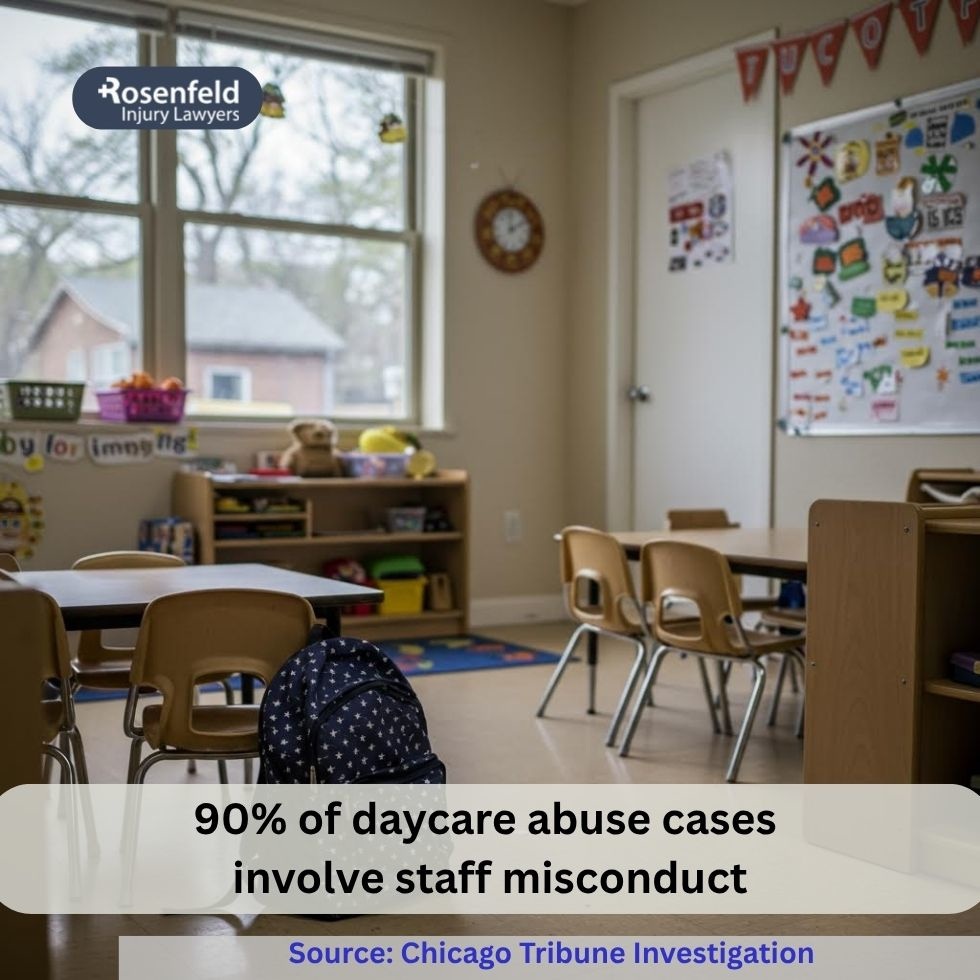
How Does the Legal Process Work After a Child Abuse Incident at a Daycare?
After a child abuse incident, families should seek medical care, document the child’s injuries, and report the situation. The legal process begins by gathering medical bills, witness statements, and records from the facility.
A lawsuit is filed against the daycare facility or the daycare employee responsible, seeking compensation for medical expenses, emotional damage, and future care needs.
Consult a Chicago Daycare Abuse Lawsuit Attorney Near You

If your child has suffered harm in a daycare facility due to neglect, abuse, or unsafe conditions, you have important legal options. Our law firm is dedicated to protecting children’s safety and holding negligent daycare centers accountable through every step of the legal process.
We understand how emotional these cases are for families. That’s why we offer a free consultation to discuss your concerns, review crucial evidence like medical records and witness accounts, and explain your options.
We work tirelessly to seek justice, recover healthcare expenses related to your child’s injuries, and pursue full financial compensation for their pain, suffering, and overall health and safety. Call (888) 424-5757 today or contact our firm online to speak with a Chicago personal injury lawyer for a free case evaluation.
All content undergoes thorough legal review by experienced attorneys, including Jonathan Rosenfeld. With 25 years of experience in personal injury law and over 100 years of combined legal expertise within our team, we ensure that every article is legally accurate, compliant, and reflects current legal standards.







